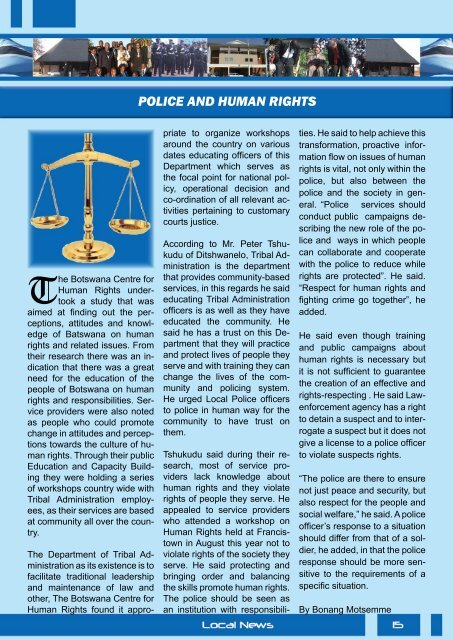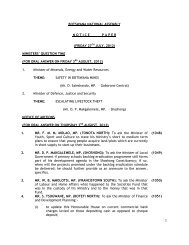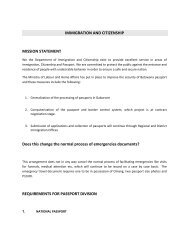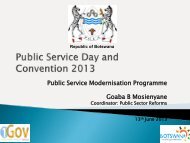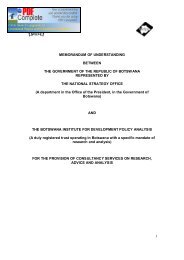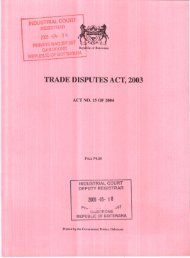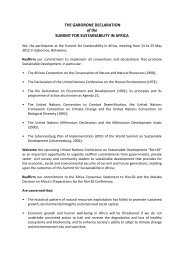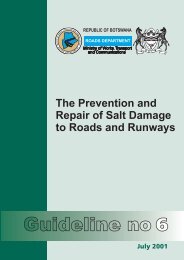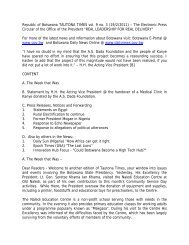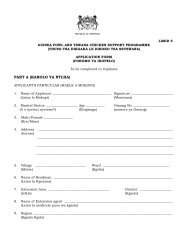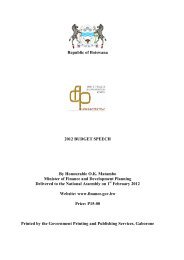Newsletter Vol II Issue 1 2007 - Government of Botswana
Newsletter Vol II Issue 1 2007 - Government of Botswana
Newsletter Vol II Issue 1 2007 - Government of Botswana
You also want an ePaper? Increase the reach of your titles
YUMPU automatically turns print PDFs into web optimized ePapers that Google loves.
POLICE AND HUMAN RIGHTS<br />
The <strong>Botswana</strong> Centre for<br />
Human Rights undertook<br />
a study that was<br />
aimed at finding out the perceptions,<br />
attitudes and knowledge<br />
<strong>of</strong> Batswana on human<br />
rights and related issues. From<br />
their research there was an indication<br />
that there was a great<br />
need for the education <strong>of</strong> the<br />
people <strong>of</strong> <strong>Botswana</strong> on human<br />
rights and responsibilities. Service<br />
providers were also noted<br />
as people who could promote<br />
change in attitudes and perceptions<br />
towards the culture <strong>of</strong> human<br />
rights. Through their public<br />
Education and Capacity Building<br />
they were holding a series<br />
<strong>of</strong> workshops country wide with<br />
Tribal Administration employees,<br />
as their services are based<br />
at community all over the country.<br />
The Department <strong>of</strong> Tribal Administration<br />
as its existence is to<br />
facilitate traditional leadership<br />
and maintenance <strong>of</strong> law and<br />
other, The <strong>Botswana</strong> Centre for<br />
Human Rights found it appropriate<br />
to organize workshops<br />
around the country on various<br />
dates educating <strong>of</strong>ficers <strong>of</strong> this<br />
Department which serves as<br />
the focal point for national policy,<br />
operational decision and<br />
co-ordination <strong>of</strong> all relevant activities<br />
pertaining to customary<br />
courts justice.<br />
According to Mr. Peter Tshukudu<br />
<strong>of</strong> Ditshwanelo, Tribal Administration<br />
is the department<br />
that provides community-based<br />
services, in this regards he said<br />
educating Tribal Administration<br />
<strong>of</strong>ficers is as well as they have<br />
educated the community. He<br />
said he has a trust on this Department<br />
that they will practice<br />
and protect lives <strong>of</strong> people they<br />
serve and with training they can<br />
change the lives <strong>of</strong> the community<br />
and policing system.<br />
He urged Local Police <strong>of</strong>ficers<br />
to police in human way for the<br />
community to have trust on<br />
them.<br />
Tshukudu said during their research,<br />
most <strong>of</strong> service providers<br />
lack knowledge about<br />
human rights and they violate<br />
rights <strong>of</strong> people they serve. He<br />
appealed to service providers<br />
who attended a workshop on<br />
Human Rights held at Francistown<br />
in August this year not to<br />
violate rights <strong>of</strong> the society they<br />
serve. He said protecting and<br />
bringing order and balancing<br />
the skills promote human rights.<br />
The police should be seen as<br />
an institution with responsibilities.<br />
He said to help achieve this<br />
transformation, proactive information<br />
flow on issues <strong>of</strong> human<br />
rights is vital, not only within the<br />
police, but also between the<br />
police and the society in general.<br />
“Police services should<br />
conduct public campaigns describing<br />
the new role <strong>of</strong> the police<br />
and ways in which people<br />
can collaborate and cooperate<br />
with the police to reduce while<br />
rights are protected”. He said.<br />
“Respect for human rights and<br />
fighting crime go together”, he<br />
added.<br />
He said even though training<br />
and public campaigns about<br />
human rights is necessary but<br />
it is not sufficient to guarantee<br />
the creation <strong>of</strong> an effective and<br />
rights-respecting . He said Lawenforcement<br />
agency has a right<br />
to detain a suspect and to interrogate<br />
a suspect but it does not<br />
give a license to a police <strong>of</strong>ficer<br />
to violate suspects rights.<br />
“The police are there to ensure<br />
not just peace and security, but<br />
also respect for the people and<br />
social welfare,” he said. A police<br />
<strong>of</strong>ficer’s response to a situation<br />
should differ from that <strong>of</strong> a soldier,<br />
he added, in that the police<br />
response should be more sensitive<br />
to the requirements <strong>of</strong> a<br />
specific situation.<br />
By Bonang Motsemme


